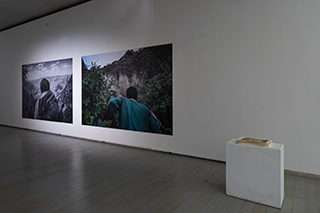
Rossella Biscotti, Note su Zeret | Notes on Zeret 2014-2015
stampa blue back, stampe risograph | blue back print, risograph prints
Courtesy dell’artista | Courtesy of the artist
Notes on Zeret is a visual diary realized in the cave of Zeret in the Manz province of Ethiopia. The artist, accompanied by descendants of the Ethiopian resistance fighters who had taken refuge with their community and set-up a guerrilla base for a large number of people in the cave, visited and photographed the location. The cave of Zeret was besieged and attacked with mustard gas by the Italian army from April 9 till April 11,1939. Most of the people were executed by machine gun outside the cave while trying to flee the chemical attack. Evidence collected by researchers and archaeologists point out that around 2000 people had been living in the cave. These images serve as a documentation of this community and the traces that were left after the attack. Reportedly most of the community was killed in this massacre with only around 15 survivors left to tell the story and to pass it on to their descendants. In 2006 through the research of historian Matteo Dominioni, information on this massacre was made public for the first time in Italy.
Notes on Zeret consists of ten risograph prints of images shot inside of the cave as well as two photographs, printed on paper and glued to the wall. The risograph prints include members of the Zeret community explaining the history of the event in the cave and pointing to signs of the large well-organized guerrilla base: hearths used for cooking, shards of broken pottery, fragments of grinding stones and other elements interspersed with traces of the violence of the massacre. The two photographs were taken on the path from the village of Zeret to the cave in the basalt cliff; the artist and ten members of the community trekked down the mountain guided by the elder Elfinesh Tegeni, the daughter of one of the survivors, and who appears from her back in one of the photographs here. The risographs are available for people to take.